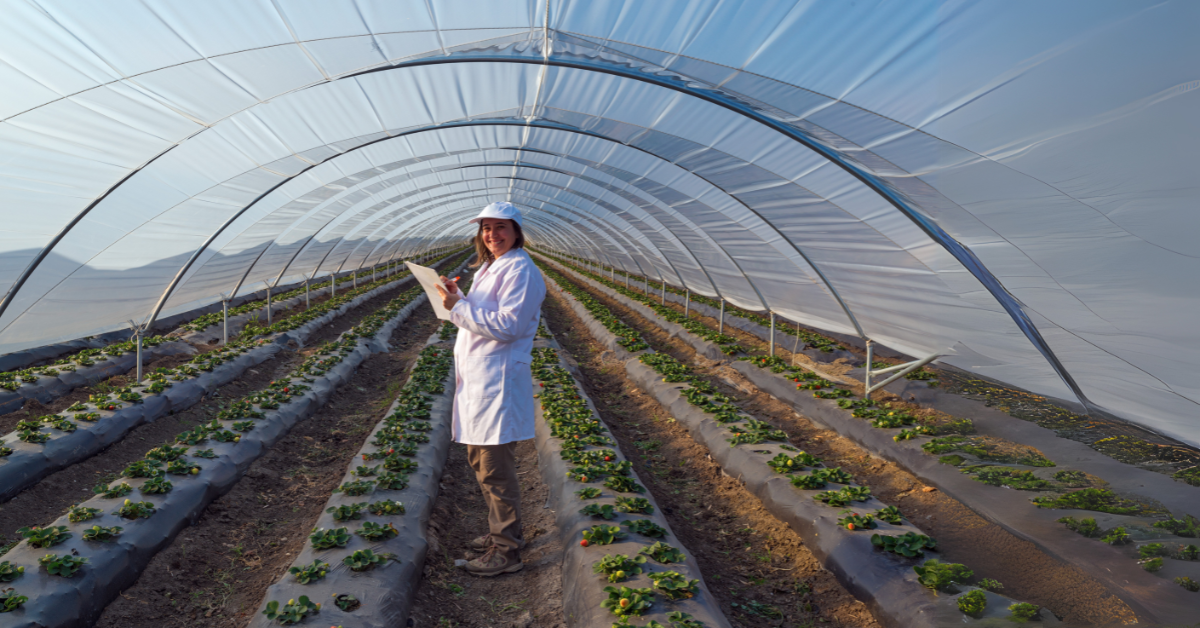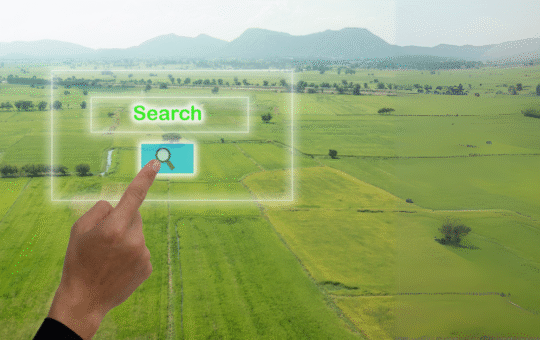
Level 6 Agricultural Engineering for Global Food Security
- Cutting-Edge Knowledge: Gain expertise in the latest agricultural engineering techniques and technologies that support global food security.
- Global Impact: Be part of the global effort to ensure food security by developing engineering solutions that address the challenges of feeding a growing population.
- Sustainable Agriculture: Learn how to design and implement sustainable agricultural systems that meet the demands of food production while conserving resources and protecting the environment.
- Career Advancement: Enhance your career prospects in agricultural engineering, sustainability, and food security with specialized knowledge and skills.
- Practical Experience: Engage with real-world case studies and projects that demonstrate the practical application of agricultural engineering solutions in global food security efforts.
- Understand the Challenges of Global Food Security: Comprehend the global food security challenges and the role of engineering in addressing these issues.
- Precision Agriculture Technologies: Apply precision farming techniques and technologies to optimize crop production and reduce environmental impact.
- Smart Agriculture Systems: Design and implement smart agricultural systems using IoT (Internet of Things), automation, and data analytics to enhance food production efficiency.
- Sustainable Water Management: Develop and implement water-efficient irrigation systems and technologies that support sustainable agriculture in water-scarce regions.
- Crop Protection and Pest Management: Utilize advanced techniques in crop protection and pest management to minimize crop losses and improve food quality.
- Renewable Energy Solutions: Integrate renewable energy technologies (solar, wind, bioenergy) into agricultural systems to reduce reliance on fossil fuels and improve sustainability.
- Food Storage and Preservation: Design systems for effective food storage and preservation to reduce post-harvest losses and improve food security.
- Global Policy and Governance: Analyze policies and strategies related to global food security, including international food trade, agricultural subsidies, and food security initiatives.
- Sustainability and Environmental Impact: Evaluate the environmental impact of agricultural practices and design systems that promote sustainable and responsible food production.
- Introduction to Global Food Security
- The challenges and importance of food security in the 21st century.
- Global agricultural trends, threats to food security, and policy frameworks.
- Role of engineering in advancing food security goals.
- Precision Agriculture and Smart Farming
- The role of technology in optimizing agricultural production.
- Implementing precision farming systems, including GPS, sensors, and drones.
- Data-driven decision-making and its impact on crop yields and resource use efficiency.
- Sustainable Water Management for Agriculture
- Water scarcity and its impact on food production.
- Designing efficient irrigation systems (drip, sprinkler, and smart irrigation).
- Techniques for water conservation and management in agriculture.
- Renewable Energy in Agriculture
- The role of renewable energy in agricultural systems.
- Solar, wind, and biomass energy applications in farming.
- Designing energy-efficient farming systems and reducing reliance on traditional energy sources.
- Agricultural Machinery and Equipment for Food Security
- Innovations in agricultural machinery and equipment for efficient food production.
- Automation and robotics in farming: enhancing productivity while reducing labor costs.
- Designing systems for efficient planting, harvesting, and food processing.
- Crop Protection and Integrated Pest Management
- Techniques for sustainable crop protection and pest management.
- Advanced technologies in pest monitoring and control.
- Reducing chemical pesticide use and promoting organic farming practices.
- Food Storage, Preservation, and Distribution
- Importance of post-harvest management in food security.
- Design of food storage and preservation systems to reduce food spoilage and waste.
- Cold chain logistics and transportation for food distribution.
- Sustainable Agricultural Practices and Climate Change
- Designing agriculture systems that are resilient to climate change.
- Soil conservation techniques and sustainable land management.
- Strategies for increasing food production while mitigating environmental impact.
- Global Policies, Governance, and Food Security Frameworks
- Analysis of international policies related to food security, food trade, and agricultural subsidies.
- Global food security organizations and initiatives.
- Role of governance in ensuring access to food and sustainable agricultural practices.
- Agricultural Engineer
- Food Security Consultant
- Sustainable Agriculture Specialist
- Agricultural Project Manager
- Precision Agriculture Technologist
- Water Resource Engineer
- Renewable Energy Specialist for Agriculture
- Food Systems Analyst
- Agriculture Policy Advisor
- Environmental and Sustainability Manager in Agriculture
- Expert Faculty: Learn from experienced professionals and industry leaders with expertise in agricultural engineering and food security.
- Hands-On Learning: Engage with practical case studies and field projects that demonstrate how engineering can improve global food security.
- Cutting-Edge Technologies: Learn about the latest innovations in precision farming, renewable energy, and sustainable water management.
- Global Perspective: Understand the complexities of global food security and how engineering solutions can address these challenges.
- Industry Connections: Access networking opportunities with professionals and organizations in the field of agricultural engineering and food security.
Study Units
- Introduction to Global Food Security
- The challenges and importance of food security in the 21st century.
- Global agricultural trends, threats to food security, and policy frameworks.
- Role of engineering in advancing food security goals.
- Precision Agriculture and Smart Farming
- The role of technology in optimizing agricultural production.
- Implementing precision farming systems, including GPS, sensors, and drones.
- Data-driven decision-making and its impact on crop yields and resource use efficiency.
- Sustainable Water Management for Agriculture
- Water scarcity and its impact on food production.
- Designing efficient irrigation systems (drip, sprinkler, and smart irrigation).
- Techniques for water conservation and management in agriculture.
- Renewable Energy in Agriculture
- The role of renewable energy in agricultural systems.
- Solar, wind, and biomass energy applications in farming.
- Designing energy-efficient farming systems and reducing reliance on traditional energy sources.
- Agricultural Machinery and Equipment for Food Security
- Innovations in agricultural machinery and equipment for efficient food production.
- Automation and robotics in farming: enhancing productivity while reducing labor costs.
- Designing systems for efficient planting, harvesting, and food processing.
- Crop Protection and Integrated Pest Management
- Techniques for sustainable crop protection and pest management.
- Advanced technologies in pest monitoring and control.
- Reducing chemical pesticide use and promoting organic farming practices.
- Food Storage, Preservation, and Distribution
- Importance of post-harvest management in food security.
- Design of food storage and preservation systems to reduce food spoilage and waste.
- Cold chain logistics and transportation for food distribution.
- Sustainable Agricultural Practices and Climate Change
- Designing agriculture systems that are resilient to climate change.
- Soil conservation techniques and sustainable land management.
- Strategies for increasing food production while mitigating environmental impact.
- Global Policies, Governance, and Food Security Frameworks
- Analysis of international policies related to food security, food trade, and agricultural subsidies.
- Global food security organizations and initiatives.
- Role of governance in ensuring access to food and sustainable agricultural practices.
Upon completion of the diploma, learners will be able to:
- Understand the Challenges of Global Food Security: Comprehend the global food security challenges and the role of engineering in addressing these issues.
- Precision Agriculture Technologies: Apply precision farming techniques and technologies to optimize crop production and reduce environmental impact.
- Smart Agriculture Systems: Design and implement smart agricultural systems using IoT (Internet of Things), automation, and data analytics to enhance food production efficiency.
- Sustainable Water Management: Develop and implement water-efficient irrigation systems and technologies that support sustainable agriculture in water-scarce regions.
- Crop Protection and Pest Management: Utilize advanced techniques in crop protection and pest management to minimize crop losses and improve food quality.
- Renewable Energy Solutions: Integrate renewable energy technologies (solar, wind, bioenergy) into agricultural systems to reduce reliance on fossil fuels and improve sustainability.
- Food Storage and Preservation: Design systems for effective food storage and preservation to reduce post-harvest losses and improve food security.
- Global Policy and Governance: Analyze policies and strategies related to global food security, including international food trade, agricultural subsidies, and food security initiatives.
- Sustainability and Environmental Impact: Evaluate the environmental impact of agricultural practices and design systems that promote sustainable and responsible food production.
The Level 6 Diploma in Agricultural Engineering for Global Food Security is designed for professionals who are passionate about tackling global food security challenges through engineering-driven solutions. This course is ideal for:
Agricultural Engineers and Technologists
Experienced professionals in agricultural engineering who wish to specialize in sustainable food production and enhance their knowledge of modern farming technologies aimed at ensuring global food security.
Sustainability and Food Security Professionals
Individuals in the food security, sustainability, and environmental sectors who want to deepen their understanding of how engineering can optimize food production and minimize food waste, while promoting environmental sustainability.
Project Managers and Consultants
Professionals involved in large-scale agricultural projects or food security initiatives who wish to gain advanced skills in managing and implementing engineering solutions that improve food systems on a global scale.
Researchers and Innovators in Agriculture
Those involved in the development and innovation of farming technologies, who want to explore cutting-edge solutions in precision agriculture, renewable energy for farming, and advanced crop protection methods.
Policy Makers and Global Food Security Advocates
Individuals working with government agencies, NGOs, or international organizations focused on food security who wish to understand the engineering and technological aspects that can support policy decisions and sustainable agricultural practices.
Water Resource and Energy Engineers
Engineers focused on water resource management or renewable energy systems who want to apply their expertise in agricultural systems to address water scarcity and enhance energy efficiency in farming.
Future Leaders in Agricultural Engineering
Professionals who aspire to take on leadership roles in agricultural engineering, policy-making, or global food security efforts, and who are committed to making a difference in addressing the challenges of feeding the global population.
Our assessment process is designed to ensure every learner achieves the required level of knowledge, skills, and understanding outlined in each course unit.
Purpose of Assessment
Assessment helps measure how well a learner has met the learning outcomes. It ensures consistency, quality, and fairness across all learners.
What Learners Need to Do
Learners must provide clear evidence that shows they have met all the learning outcomes and assessment criteria for each unit. This evidence can take different forms depending on the course and type of learning.
Types of Acceptable Evidence
Assignments, reports, or projects
Worksheets or written tasks
Portfolios of practical work
Answers to oral or written questions
Test or exam papers
Understanding the Structure
Learning outcomes explain what learners should know, understand, or be able to do.
Assessment criteria set the standard learners must meet to achieve each learning outcome.
Assessment Guidelines
All assessment must be authentic, current, and relevant to the unit.
Evidence must match each assessment criterion clearly.
Plagiarism or copied work is not accepted.
All learners must complete assessments within the given timelines.
Where applicable, assessments may be reviewed or verified by internal or external quality assurers.
Full learning outcomes and assessment criteria for each qualification are available from page 8 of the course handbook.
Top Courses
No results found.
Related Courses
Let's Get in touch
Deleting Course Review
Course Access
This course is password protected. To access it please enter your password below:



